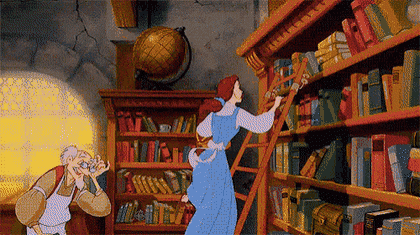A study was done asking people ages 25 to 65 to estimate how many books were in their homes when they were 16.
Turns out that growing up with few books in the home resulted in below average literacy levels later in adulthood. Having 80 books in the house boosted the levels to average, “and literacy continued to improve until (home) libraries reached about 350 books, at which point the literacy rates leveled off.”
The same sorts of trends, although not as strongly, were found in the subjects mathematical skills and ability to use technology to communicate.
The study found that someone who grew up with a large home library, but only had nine years of schooling had a similar literacy level to someone who grew up with hardly any books, but went on to obtain a degree from a university.
“So, literacy-wise, bookish adolescence makes up for a good deal of educational advantage,” the study authors write.
Like all studies, a lot more research needs to be done, and I would say off the top of my head that it seems like households that have larger libraries would generally be households who value an education more strongly, so l don’t know that I attribute all this to home library size. But I did find it interesting that books and reading in adolescents gives a good advantage throughout life.
Did you grow up around a lot of books? How do you think it affected you?




My favorite place in our small town was the library beneath the town hotel. It was dark and cosy from the steam heat pipes and had wonderful leather club chairs to curl up in. To a kid it was magic, with the added plus of being just down the street.
no we did not have the money to buy books, I would read some at my high school library, and too there were not that many books that I liked to buy I did read and buy when I got in my twenties and later and still buy books now or get them at a library.
We didn’t have a library in my home growing up but there was always something to read. I would borrow books from the school library and when I got older, my mother would let me read her books. I also brought all of my text books home daily so that I could stay ahead of my homework. I will NOT throw a book away. I have boxes of books stored away until I can put them in a bookcase. I have many, many books on my kindle. Reading is still my favorite type of relaxation.
There were no books available when I was growing up. I grew up in a very bad household. Books were the only escape I could find. Believe it or not, back in the 70s, grocery stores had a book isle, and that is where I could be found every Saturday while Mom was shopping. I cut my teeth on Nancy Drew and The Hardy Boys, but what set me on the road of everlasting love of books was, Sybil by Flora Rheta Schreiber. I was like wow, there is someone more messed up than me. From then on, books was my escape and salvation.
~2000 books. Both parents read widely, one taught English. Books were staple presents for birthdays and Christmas. My kids grew up with about 1000 books in the house–didn’t have room for anymore.
We didn’t have a lot of books at my house but we lived less than a mile from the library. My mother decreed that if we stayed home on Saturday, we had to clean the house. I spent that time in the library–I still hate vacuuming.
Seriously, 80 books in a house at one time? WTF? I had a 12th grade reading avg in 4th grade and got all my books from the library. Really, who the fuck has room for 350 books? (where it evens out?) I keep the ones I love ( Dickens, Tolkein, Zelazny, RR Martin, whatever) and read over and over but I have way less than the recommended amount. The rest are readily available and the search for them is encouraged
I didn’t personally have a lot of books in our home growing up. But my uncle did. I have gone to the library in every place I have lived my whole life. I still dream of having a place big enough to have my own personal library but until then I still have my local library.
One of my earliest memories is being ill – I had measles or something – and my father returning from work with an Enid Blyton book. Heaven! I totally agree that a house that values books places education high on its priority list. It’s probably not the number of books in the house, but nurturing the love of reading that counts. Borrowing books from the library counts as well 🙂
When I was young I grew up around the corner from a library. I read probably all the books. I had books at home as well. I still read a lot. My books are as perfect as the day they were bought or gifted to me. Can’t imagine not reading
I had a collection of about 25 books that I treasured and reread many times. I did the same with the 2 shelves of children’s books at our small town library. There were never enough books for me. Chosen career? Librarian. When it’s in you; you find a way. Public libraries are still the answer. So are e-books. If a child has the device, he/ she has access to an unlimited supply. Let’s put one in every child’s hands!
Growing up it was just my mom and me. We tend to move around alot for different reasons each year. So I was unable to keep a lot of items. The libraries became a home away from home and the librarians became my best friends. Growing up I always wanted to be a librarian. Now that I’m older and finally found a permanent place to call home my personal library has been growing. I don’t tend to buy brand new books too often, not just because of price but I love my local Half Price Bookstore. It’s kinda like going to an animal shelter. All these poor books abandon looking for a new place to call home. The clearance section, last chance section, is my favorite. $1 book (well not always), random find (always), and a new favorite author. I have been introduced to more authors that I love within the clearance section than I have with online book #1 free authors. For no other reason beyond the fact that I love having a physical book in hand verse digital. My kid is part klepto so I’m always worried about letting him check stuff out at libraries and never returning them. So he’s got his own personal library. Every two years we go through his collection to donate the books he’s outgrown. I think it’s becoming a favorite event of his now that he’s a teenager. Since he knows he’s going to be getting new books to replace the older books.
My mother took my family to the city library where we checked out 10 to 20 books at a time every week for many years of my life. As soon as I got my first job, I started buying books and now we have over 100 in my family library.
But now I have goals. 350 sounds perfect.
350 sounds like a very nice well rounded number. If I had more room I would make that my goal too.
I grew up reading! My mother taught me to read at the age of 4 and I have been reading every since! When things got bad there was always a book to bring me back to the light. Reading has kept me sane all these years and its given me so much more than stories! My mother turned 70 this year and I think reading and a love of books is one of the best things she has ever given me.